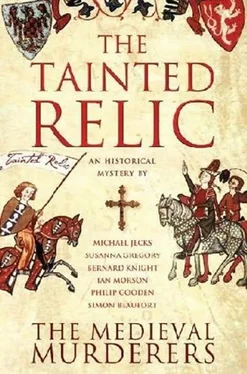‘Tell me, Talam. Brother John-is he bald? With little tufts of white hair at his ears?’ Falconer demonstrated the tufts he had seen on the corpse by bunching up his own fingers at the sides of his temple, and jabbing them back and forth.
Talam’s lips formed into a downturned curve. If Falconer had not known him, he would have thought it was a grimace. In fact it was Talam’s severe version of a smile. It was the closest he came to showing amusement.
‘That is Brother John. Let’s just say he has no longer any need of the barber to maintain his tonsure.’
‘Then I think I have some bad news for you.’
Oseney Abbey was soon awash with rumour. Including a scandalous suggestion of self-harm. Though how Brother John could have cut his own throat then lain impassively with his hands crossed on his chest was not fully explained by the instigator of that rumour. It served only to make Brother Robert Anselm more agitated, and he resorted once more to the little pilgrimage of the labyrinth. A turn into Evangelium to begin. Three turns and into Offertory. A turn and back into Evangelium. Three turns and into Offertory again. Two turns and into Consecration. Two turns and into Communion. The holy path led hypnotically back and forth, calming his soul. Until Brother Robert reached the Holy Jerusalem in the centre of the labyrinth, there to enter the second step of the threefold path.
Illumination.
As Falconer approached the abbot’s offices, he heard raised voices. Or more exactly, one raised voice interspersed with the weary tones of Ralph Harbottle, the abbot.
‘You must find more money, or the supplies of stone will run out. Then the work for my men will dry up, and I will be forced to find them work elsewhere.’
The foreign tones were guttural and peremptory, the talk of building work. It had to be Eudo La Souch, the master mason. In reply, Harbottle’s voice betrayed a man run ragged, and weary of the distraction.
‘In truth, Master, you should speak to Brother Peter about this. He is the bursar.’
‘And he tells me he cannot conjure funds from the air. He says you need to attract more pilgrims. The priory in the town not only has its saint, now it has the blood of St Thomas the Martyr too.’ The Hollander paused, then continued in more wheedling tones. ‘I was told my predecessor knew something about a relic…’
‘No!’ Ralph Harbottle’s voice was suddenly firm and peremptory. ‘No, I forbid you to speak of the matter. If we have to delay the work begun by Abbot Leech, then so be it. The new buildings have been twenty years in the making already, another twenty will not matter greatly. You have only been in charge for two years. There is plenty of time ahead of you.’
‘Not if you cannot pay me.’
Falconer stepped back as a stocky, well-built man stormed out of the abbot’s office. His weather-beaten face betrayed his outdoor occupation, as did the knotty muscles of his arms protruding from the rolled-up sleeves of his dark blue tunic. He scowled at the Regent Master in his path, and Falconer stepped aside. The mason pushed past, and stomped off down the passageway. It seemed Eudo La Souch was not a man to be crossed when he was in a temper.
‘Ah, Master Falconer. Thank you for coming. A bad business this.’
Falconer turned to look at the tired abbot, Ralph Harbottle, standing in the doorway to his inner sanctum. The man seemed even older than when Falconer had seen him last. His skin was ashen, and parchment thin, his grey hair hung lankly on his forehead, and in thin wisps over his ears. Falconer imagined that if he hadn’t been holding on to the door frame, the abbot might have collapsed.
‘The murder, I mean.’
Falconer hadn’t imagined it had been anything else that Harbottle was ruing. But perhaps his mind had still been on the row with the master mason, and the shortage of funds. Falconer was also curious about the reference to a relic, but he put it out of his mind owing to the pressing matter of the murdered canon. At Talam’s insistence, he had reluctantly agreed to see the abbot. Though unwilling to get involved, he agreed he should at least tell Harbottle face to face what he had seen.
‘Indeed, Abbot.’
‘I have arranged for the body to be brought back here. Though I have no doubt that the constable will want to interfere, and ask questions of all the brothers. You know the sort of thing. “Where were you last night?” and “Did you murder Brother John?”’
Harbottle threw his hands up in a gesture of disgust at the idea. Prompted by such thoughts of Bullock blundering in, Falconer spoke without further consideration. At the same time cursing himself for breaking his own resolve not to become involved.
‘You cannot think of a reason why anyone at the abbey should have had cause to envy or dislike Brother John Barley, can you?’
Harbottle looked shocked.
‘I knew it! Master Falconer, this is a house of God, a place of prayer and contemplation. There is no room for envy or hatred, nor any of the vices that might occasion such intemperate feelings.’
Falconer refrained from reminding the abbot of the scandalous murder that had previously taken place at the abbey, and who the perpetrator had been. It looked as though it would not take much more to crush the poor man totally. He was clearly at the end of his tether over the changing fortunes of the abbey. But Harbottle was also a perceptive man. He would not have risen so high in his order if he had not been so. And he could see the clouded look in Falconer’s eyes. For a man of uncommon piety, he was also a realist. He sighed, and flopped down on to the hard, wooden seat behind him.
‘I am sorry, Falconer. I am beginning to fear that being in charge of the abbey is getting beyond me. During my novitiate I never dreamed of having to face such complicated…secular issues. As a novice, my day was filled with labour and the contemplation of God. Now all I am allowed to think about is the difficulty of getting supplies of stone. And the passing of fellow canons of my generation. There have been too many of them of late, I fear. First there was Brother Benedict, then the unfortunate accident suffered by Brother William…’
Falconer interrupted the abbot’s ramblings.
‘Brother John. Was he a contemporary of yours too?’
‘Yes, we entered the novitiate together. Virtually on the same day. And I can assure you no one even disliked him, much less hated him enough to…to try and hack his head off. He was inclined to pranks, but never malicious.’
The abbot shuddered, and bowed his head in prayer. After a few moments, Falconer slipped silently out of the room. There appeared to be nothing to be gained by questioning the abbot further. He would return to Oxford, and see what Peter had dug up.
The bustle of St Frideswide’s holy day market was at its height. The environs of the church thronged with sellers of candles and insignia, pilgrim badges and tempting victuals. Many of the faces in the crowd belonged to robust young men. They were peregrini , professional pilgrims who hired themselves out for pay. They performed pilgrimages and penances on behalf of those rich enough to want to avoid the discomfort of wandering from shrine to shrine in the inclement weather England threw at them. Peter Bullock elbowed his way through the throng, his ears impervious to the blandishments of the stall-holders. He wanted to speak to Brother Richard Yaxley about his altercation with the dead canon before the murder became too widely talked about. He didn’t want Yaxley to have any time to prepare a story.
Mounting the steps of the church, Bullock ignored the mumbled complaints of the line of pilgrims waiting their turn at St Frideswide’s shrine. They probably thought he was trying to push in ahead of them. But when they turned round and saw his stony face, all their cavilling ceased. Instead, the pilgrims looked furtively at their feet, at the intricately carved stonework, at their neighbours in the queue. Anywhere to avoid the constable’s implacable gaze. Inside, the church was a blaze of light. Extra candles and tapers lit the interior, especially the rear of the high altar where the shrine stood. The scene did not inspire Bullock. In fact, it was an irritant to him. He knew the two chaplains who scurried back and forth, and that many of the tapers were paid for out of a grant forced on the Sheriff of Oxford by King Henry after his spat with the barons five years earlier. The town had favoured the barons, and when the King had ultimately triumphed, the town had paid the price. To the tune of one hundred shillings annually. The tapers burned night and day for the soul of the King, in an attempt to neutralize the curse said to fall on any monarch entering the confines of the town.
Читать дальше












